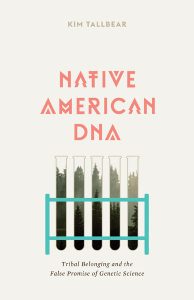Native American DNA by Kim Tallbear

Reading this book was a phenomenal education. I was keen to read work by Indigenous scholars working in the life sciences in order to fulfill one of the challenges given to me by our Indigenous Initiatives consultant- to educate myself about the harms that my discipline has done to Indigenous peoples. Although this book is focused more on molecular genetics, and specifically the use of genetic sequencing technology in the fields of genealogy and anthropology, neuroscience certainly makes use of genetic information.
When I started reading this book, I struggled to grasp some of the concepts and had to read the new terms slowly to let their meaning sink in: technoscientific, semiotic, coproduction, co-constitution. Although it took a while for my brain to adjust to the new terminology, it was more than worth the mental effort. Much of what I learned has been genuinely transformative, and I hope I will carry the lessons I have learned with me and act upon them whenever I can for as long as I am a scientist.
While a short blog post cannot hope to do justice to the full contents of a book, I will aim to summarise some of the key take-home messages.
p. 5 “Scientists who trace human migrations do not tell a story from the standpoint of those peoples who were encountered; they tell a story from the standpoint of those who did the encountering”
When communities are sampled, e.g. for genetic analysis, some individuals are excluded if their ancestry is seen to be too diffuse, whereas others are deemed to be sufficiently representative of a certain inheritance e.g. as a tribe or nation member. Western scientists are essentially telling people who they are, and labelling them as in or out-group. These labels are then applied in a scientific study, and the research process gives them greater validity due to the power and faith put into science. Indigenous peoples need to have far more control over this whole process. Scientific research cannot tell Indigenous people “who they are”.
The “vanishing” of Indigenous peoples is neither inevitable nor happening right now; this assumption can be used by researchers to justify urgently documenting and sampling both cultural practices and DNA, without sufficient consideration of whether the Indigenous peoples themselves stand to benefit from such research and indeed may even be harmed by it.
p.19 “From the vantage point of the colonised… the term research is inextricably linked to European imperialism and colonialism. The word itself, “research”, is probably one of the dirtiest in the Indigenous world’s vocabulary.” Linda Tuhiwai Smith, “Decolonising Research 1999
Science is co-produced by society and politics- it is not “pure” but shaped by the environment, beliefs, and by the people who engage in it. It can be far from neutral. There is also a significant power imbalance between those doing the researching, and those who are the subjects of research. The ethical responsibilities of being in the former category cannot be overstated.
Not all members of society currently benefit equally from scientific discovery. Distributive justice is urgently needed to ensure equity, and this will involve considering who benefits and how right from the outset of any research project. Scientists generally accept that research is for the good of all, and that the pursuit of knowledge is a universally justifiable and fair goal, but these are assumptions rather than facts. Such assumptions should be questioned thoroughly in all research, but particularly when Indigenous communities are involved.
Indigenous communities need to be co-producers of the knowledge that is generated through scientific research, rather than considered simply subjects or participants. Full engagement with Indigenous peoples from the conception of any project will help to ensure that the questions scientists are asking are actually questions that Indigenous communities themselves want answered. The added value of the proposed scientific research outputs should be justified to, and accepted, by Indigenous communities. Every opportunity should be taken to centre studies around Indigenous ways of knowing and learning. So much more breadth and diversity, and genuine discovery, could be enabled through the co-constitution of research with Indigenous knowledge. Fully participatory and collaborative research could transform academic endeavours for the better across multiple disciplines.
Catharine Winstanley, 22nd April 2022